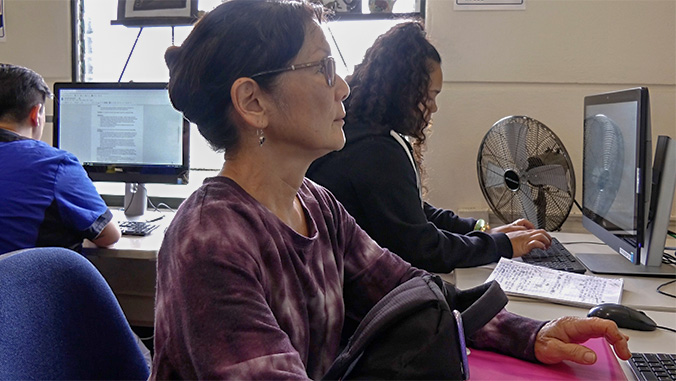More than 200 University of Hawaiʻi Community College students at four campuses are receiving assistance that can total more than $4,700 a year for food, transportation, books and other expenses through a workforce education and training program called HINET, which stands for Hawaiʻi Nutrition Employment and Training.
“Oh my gosh, the HINET program is awesome!” exclaimed Deedee Crowton, a second-semester veterinary technology student at Windward Community College, who will be the first in her family to graduate from college. “If it wasn’t for them, I wouldn’t be able to stay in school.”
Windward CC student Leomana Turalde serves as safety officer for the Project Imua student team that is designing and building a rocket for a NASA competition. He receives assistance for food and gas through HINET and he tries to let other students know about the help the program provides.
“The biggest issue I feel like I had was worrying about how am I going to eat, how am I going to stay healthy, how am I going to get places? HINET helped me just relax…we got help to cover food. We don’t gotta stress about that. I can focus on just my schoolwork,” Turalde said.
HINET was developed by the State of Hawaiʻi Department of Human Services in partnership with Windward CC and started operations in 2015 as a pilot at the Kāneʻohe campus. The U.S. Department of Agriculture matches 50 percent of non-federal funds spent in support of HINET. As more state and philanthropic dollars are invested in HINET, more USDA dollars will flow to the program, helping to reach more students.
To qualify for HINET, students must enroll at a UH community college and take at least six credits in an approved program. They must also qualify for the Supplemental Nutrition Assistance Program (SNAP), formerly called food stamps, and HINET can help with the paperwork. Importantly, students in the HINET program are able to substitute their college education and training for USDA‘s 20-hour weekly work requirement.
HINET Consortium Manager Kathy Helfrich explained, “We help them to succeed because if we can train them to do a program like our vet tech program or our certified nurse aide program, which pays decent money when they get out of school, then they will not longer be eligible for SNAP. They’ll be able to pay for food on their own.”
The best evidence that HINET helps comes from the students.
Bernadette Rose Garrett earned her associate in arts degree from Windward CC in the fall of 2018, after chairing the affordability committee for the Associated Students of the University of Hawaiʻi. She said the welcoming HINET staff helped break through her initial hesitation to ask for help.
“Having that HINET opportunity, it just gave me a way to live,” Garrett said. “It gave me a way to not stress out so much about where my next meal was going to come from.”
By fall 2019, the HINET program will expand to six UH Community College campuses statewide and to a seventh the next academic year. Current and prospective community college students are encouraged to visit the HINET website or go to a HINET office on campus.
Crowton said, “HINET is there for you. HINET wants you to succeed. HINET will help you every step of the way.”
Turalde added, “I think the biggest thing HINET helped me with is being confident in my future.”
Support HINET
Donations to support HINET will be matched by 50 percent and can be made online to donate via credit card or call (808) 956-8849 if you wish to make a credit card gift over the phone.
—By Kelli Trifonovitch


